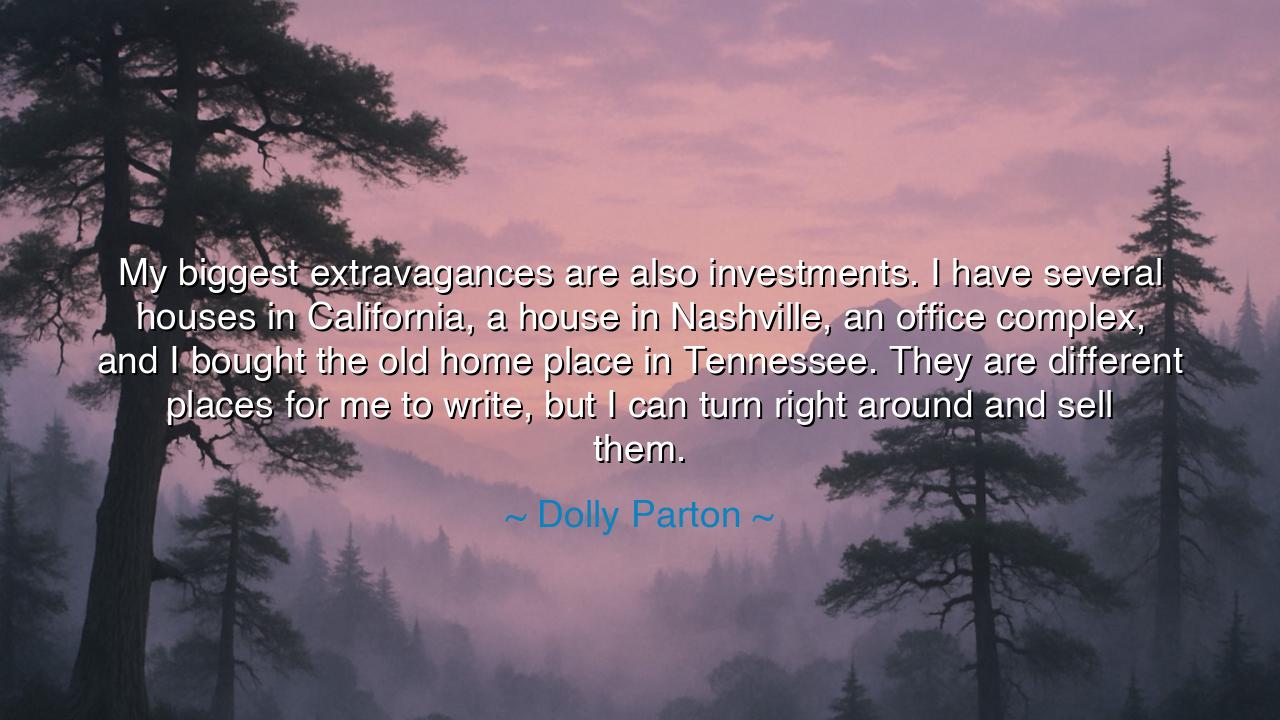
My biggest extravagances are also investments. I have several
My biggest extravagances are also investments. I have several houses in California, a house in Nashville, an office complex, and I bought the old home place in Tennessee. They are different places for me to write, but I can turn right around and sell them.






In the words of Dolly Parton, a woman whose life bridges humble beginnings and dazzling success, we hear a wisdom both practical and profound: “My biggest extravagances are also investments. I have several houses in California, a house in Nashville, an office complex, and I bought the old home place in Tennessee. They are different places for me to write, but I can turn right around and sell them.” At first, these words speak of wealth, of property, of the fruits of labor. Yet beneath them lies a philosophy older than gold — the understanding that true prosperity is not in spending, but in sowing, and that the wise find ways to make their abundance serve both their purpose and their future.
Dolly Parton, born in the mountains of Tennessee, rose from poverty to fame through music, grit, and grace. Her words are not those of indulgence, but of discernment. Where others see luxury, she sees utility; where others see expense, she sees creation. In the manner of the ancients, she treats her wealth as a tool — not for vanity, but for craft and continuity. The homes she buys are not mere symbols of status, but sanctuaries for her art, places where songs are born, where stories unfold. Yet, with the keen mind of a steward, she reminds us that even beauty can be practical, that joy can coexist with wisdom, and that the heart and the ledger need not be enemies.
To understand her wisdom is to remember the teachings of the Stoics, who believed that material possessions are neither good nor evil, but instruments in the hands of their master. Seneca, advisor to emperors, once wrote: “It is not the man who has too little, but the man who craves more, who is poor.” Dolly’s wealth does not own her; she owns it, directing it toward purpose. Her extravagances are tethered to vision, just as a ship’s sail is bound to the mast — catching the wind, but never drifting aimlessly. In this balance between enjoyment and prudence, she embodies the ancient virtue of temperance — the art of mastering desire without extinguishing joy.
Her mention of buying “the old home place in Tennessee” is especially telling. In that act, we find not just investment, but return — a soul coming full circle to honor its roots. The ancients revered such gestures, for they understood that success without remembrance is empty. When Odysseus returned to Ithaca after years of wandering, he reclaimed not only his kingdom but his identity. So too does Dolly, in purchasing her childhood home, unite past and present. It is not nostalgia that moves her, but gratitude — the understanding that to build a mansion on the hill, one must never forget the cabin by the river. Her investment, then, is both financial and spiritual, an offering to memory itself.
There is also in her words the quiet defiance of a woman who has mastered the world on her own terms. In an industry that too often consumes its stars, Dolly stands as a figure of autonomy and foresight. She knows that creativity without structure can scatter like wind, but creativity grounded in wisdom endures. By calling her luxuries “investments,” she transforms indulgence into empowerment. She is both artist and architect — shaping not only melodies but empires. And in this, she teaches what the ancients called prudence, the virtue of seeing beyond the moment into the lasting horizon of time.
The lesson here is one of balance and stewardship. To live fully, one must neither hoard nor waste, but use every gift — material and spiritual — with intention. Dolly reminds us that wealth, like talent, is a form of energy: it must flow, create, and return. The wise build not for vanity but for legacy, ensuring that what they possess continues to bear fruit. Whether one’s treasure be money, skill, or time, the question remains the same: Does it serve your purpose, or do you serve it? The ancients would call this the question of the soul.
And so, let us remember the teaching of Dolly Parton — a modern sage in rhinestones. Live with purpose, create with passion, and invest with wisdom. Let your pleasures also be your provisions; let your work be both a song and a structure. Own what you have built, and let what you own build you in return. For in a world that confuses excess with success, her voice calls us back to a more enduring truth: that the greatest wealth is not in how much one spends, but in how deeply one understands the worth of what one has — and how wisely one uses it to build both beauty and belonging.






AAdministratorAdministrator
Welcome, honored guests. Please leave a comment, we will respond soon